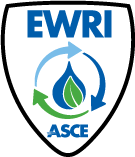Monday, July 20, 2020 | 1:00 PM - 2:40 PM
Welcome, Introduction and Presentation of the UWRRC Founder's Award
Scott Struck, EWRI 2020 President
Dwane Jones, Conference 2020 Co-Chair
Meghan Hazer, Conference 2020 Co-Chair
Neil Weinstein, Conference 2020 Technical Chair
Brian Parsons, Director EWRI
The Urban Water Resources Research Council Founder's Award was established to honor individuals for notable contributions that have served to advance engineering and science in the field of urban water resources research and to honor the Founders of EWRI's Urban Water Resources Research Council, pioneers in the fields of urban water management and stormwater research.
Opening Plenary
 Larry Coffman, Past Deputy Director, Prince George's County Department of Environment (retired)
Larry Coffman, Past Deputy Director, Prince George's County Department of Environment (retired)
Larry Coffman has been a regulator, consultant, educator and inventor in the stormwater industry for over 50 years working in both the public and private sectors. While working for Prince George’s County Maryland in the 1990’s 2000’s he created and became the recognized expert on the groundbreaking and national award-winning Low Impact Development approach to urban stormwater management. He pioneered bioretention (rain gardens) and developed successful commercial versions of high flow bioretention technologies.
He was a co-founder of the Maryland based Low Impact Development Center and the TX-based Convergent Water Technologies. He has authored dozens of articles and manuals on LID. He has provided LID program guidance and training around the world to countries such as China, New Zealand, Australia, Netherlands; Federal agencies such as EPA, DOD, and ACOE; and, dozens of state, county, local governments, estuary programs, counties, regional authorities, professional organizations, universities, and non-profit groups. Currently, he is retired and living on Florida’s Suncoast.
 Mami Hara, Director of Seattle Public Utilities
Mami Hara, Director of Seattle Public Utilities
Mami Hara is the Director of Seattle Public Utilities, appointed by Mayor Murray in 2016.
Mami Hara was the network coordinator of a practitioner network that supports communities seeking to expand green storm water infrastructure programs. While in Philadelphia she helped implement national models that Seattle aspires to today. Green City, Clean Waters is the nation’s most ambitious green infrastructure program and its successes are helping to define national practice. Hara had served for five years as Chief of Staff at Philadelphia Water.
She has led management and policy coordination of a renowned public utility and direction of an international design and planning firm. In her public sector and private practice roles, Mami has guided planning and implementation of award-winning green infrastructure, sustainability, economic development, and waterfront programs across the US. In those efforts, she has advanced sustainable land and water management practices through cultivating leaders, partnerships, participation, planning and knowledge sharing. Mami has degrees from the University of Pennsylvania and Harvard University and is an advisor to several planning and design advocacy organizations. She has taught at PennDesign, Temple School of Architecture and the Department of Urban Studies and Planning at MIT.
 George S. Hawkins, Esq., Founder and CEO, Moonshot LLC and Moonshot Missions
George S. Hawkins, Esq., Founder and CEO, Moonshot LLC and Moonshot Missions
George Hawkins launched his innovation-focused enterprises Moonshot LLC and Moonshot Missions after stepping down as CEO and General Manager of DC Water, where he served for eleven years. George helps agencies identify and adopt strategies to deliver better service and lower cost.
George transformed DC Water into an innovative enterprise while tripling its investment in clean water. DC Water’s innovations ranged from Green Infrastructure to a $500 million investment in clean energy. DC Water issued the first-century bond, first environmental impact bond, and spearheaded programs to support low-income customers.
George serves on the National Infrastructure Advisory Council, which advises the White House. George is an advisor to Xylem, Inc. and is an Executive in Residence for XPV Water Partners. George serves on the Boards of the North American Electric Reliability Corporation and the US Water Alliance. George has served as a Senior Lecturer at Princeton University and an Executive in Residence for American University.
Mr. Hawkins also served as Director of the DC Department of the Environment and also served as Director of non-profit organizations and held positions with the USEPA and the firm Ropes & Gray.
George is a popular speaker on water, infrastructure, and environmental issues. He has been the recipient of many awards, including the AWWA’s Fuller Award for Leadership and Innovation, Governing Magazine’s Public Official of the Year in 2015, WEF Public Official of the Year in 2016, and the Water Leader of the Year Prize in 2017. DC Water was awarded the US Water Prize in 2016.
He graduated from Princeton University (Summa Cum Laude) and from Harvard Law School (Cum Laude).
Tuesday, July 21, 2020 | 2:30 PM - 4:20 PM
Plenary Session
Green Infrastructure Innovation and Co-Benefits in the Anacostia Watershed
 Tommy Wells, Director, DC Department of Energy and Environment
Tommy Wells, Director, DC Department of Energy and Environment
Tommy Wells is the Director of the District Department of Energy and Environment. Most recently, Wells served as Ward 6 Councilmember, a position he held since 2006.
During his tenure on the DC Council, Wells won support throughout Washington for his fundamental goal: creating a livable and walkable city for all.
Wells started his Washington career in 1983 as a social worker in the DC foster care system, where he spurred and led a successful class-action lawsuit, LaShawn v. Barry, to address the city’s failure to protect children in its care. In 1991, he took the helm of the DC Consortium for Child Welfare, and later established a groundbreaking program to match foster families with children affected by HIV/AIDS and also led the drive to create the D.C. Family Court.
Wells has championed the next generation of public transit–including streetcar lines, expansion of the D.C. Circulator, and improvements in overall bus service. In addition, he crafted a landmark bill to charge a nominal fee on disposable bags.
Wells graduated from the Columbus School of Law at Catholic University in 1991 and earned a Master’s degree in Social Work from the University of Minnesota in 1983.
 Adam Ortiz, Director, Department of the Environment, Montgomery County, MD
Adam Ortiz, Director, Department of the Environment, Montgomery County, MD
Adam Ortiz is the Director of the Montgomery County Department of Environmental Protection, a $140 million agency with 300 employees and contractors. The Department oversees programs for watershed restoration, greenhouse gas reduction, renewable energy, sustainability, and environmental compliance.
Prior to joining Montgomery County, Adam served as the Director of the Department of Environment for Prince George’s County, Maryland, from 2012 through 2018 where he oversaw stormwater management, recycling, waste management, animal services, and sustainability programs. He launched several industry-leading initiatives including the largest municipal organics composting facility in the country, a $100 million public-private partnership for green infrastructure focusing on small and local business development, and various partnerships with faith, nonprofit, and business sectors.
 Joe Gill, Director, Department of the Environment, Prince Georges County, MD
Joe Gill, Director, Department of the Environment, Prince Georges County, MD
Joseph P. Gill was confirmed as the Director of the Prince George’s County Department of the Environment (DoE) on May 14, 2019. He previously served as the Deputy Director of DoE where he was responsible for overseeing day-to-day agency operations for clean water, flood control, recycling, waste management, litter prevention and animal services.
He joined the County from the Maryland Department of Natural Resources (DNR) where he served as Secretary (2013-15) and Deputy Secretary (2010-13). Gill chaired the Governor's Council on the Chesapeake Bay; represented the Governor on President Obama’s Task Force on Climate Preparedness and Resilience and served on the Maryland Climate Change Commission; and co-chaired with the Maryland Superintendent of State Schools the Maryland Partnership for Children in Nature.
Tuesday, July 21, 2020 | 4:00 PM - 5:20 PM
Panel Discussion
Washington DC's Award Winning Approach to Watershed Restoration
Cecilia Lane, DOEE
Brian Arvai, Biohabitats, Inc
Ted Brown, Biohabitats, Inc
Josh Burch, DOEE
Wednesday, July 22, 2020 | 3:45 PM - 5:00 PM
Panel Discussion
Building our Communities: DC Water's Clean Rivers Project for Green Infrastructure
Seth Charde, DC Water
Amanda Zander, Delon Hampton & Associates Chartered
Eric Lienhard, PE; Hazen and Sawyer
Wednesday, July 22, 2020 | 3:45 PM - 5:00 PM
Panel Discussion
Panel Discussion: Exploring Green Stormwater Infrastructure as an Integrated Tool to Improve Resiliency
Saleem Chapman, Deputy Director, Philadelphia Office of Sustainability
Jordan Fischbach, Co-Director, RAND Climate Resilience Center
Carrie Grassi, Deputy Director for Planning, NYC Mayor’s Office of Resiliency
John Miller, Mitigation Liaison to NJ Office of Emergency Management, FEMA
Shandor Szalay, Senior Vice President, AKRF, Inc.
Moderator:
Maggie Hopkins, Senior Technical Director, AKRF, Inc.
Thursday, July 23, 2020 | 2:30 PM - 3:50 PM
Ethics Session
Meghan Hazer, City of Baltimore, MD
Dwane Jones, UDC
Thursday, July 23, 2020 | 3:50 PM - 5:05 PM
Expanded Session
Permeable Interlocking Concrete Pavement
David R. Smith, Technical Director, Interlocking Concrete Pavement Institute
Presentation Outline:
Introduction and site suitability evaluation methods and tool
Municipal flood reduction examples and pollutant reduction performance
Hydrologic design overview
Structural design method developed from full-scale PICP load testing
Construction do’s and don’ts
Handling slopes and utilities
Maintenance evaluation methods and recent developments in cleaning equipment
Friday, July 24, 2020 | 1:00 PM - 2:40 PM
Introduction to the Closing Plenary
Scott Struck, EWRI 2020 President
Dwane Jones, Conference 2020 Co-Chair
Meghan Hazer, Conference 2020 Co-Chair
Neil Weinstein, Conference 2020 Technical Chair
Closing Plenary
Bridget Wadzuk, Villanova University
Friday, July 24, 2020 | 2:50 PM - 4:00 PM
Technical Workshop: Planting Strategies to Survive and Thrive: Keeping the Bio in Bioretention
Ann English- Montgomery County, MD
Donna Evans- Montgomery County, MD
Plants are a key part of LID/GSI bioretention systems. They provide functional value and multiple environmental, social, and community benefits. LID systems are touted as a visual amenity to communities through lush plantings and immersive landscapes. Achieving and maintaining LID as a community amenity takes work and practitioners have found it is more difficult than initially thought to bring the lush landscape to life. Plants need water and good soil conditions, competition with weeds needs to be controlled, and maintenance crews need to know what they are maintaining. This workshop will give practical tips on how to create and maintain a planted landscape to survive and thrive. What are the best plant selections, what establishment regime is needed, and how little maintenance can be done? This interactive workshop will bring together landscape professionals and municipal program managers to give you the time tested and latest techniques to create bioretention landscapes to survive and thrive. Bring your planting challenges and share with the group while the experts provide strategies and solutions. Practical solutions will be discussed that you can incorporate into your planting designs and program.
Friday, July 24, 2020 | 2:50 PM - 5:00 PM
Technical Workshop: Integrated Decision Support (I-DST) Beta Testing for Stormwater Practitioners
Colorado Mines Group
The i-DST is a planning-level stormwater decision support tool that helps practitioners select the most appropriate suites of green, grey, and/or hybrid infrastructure. The tool is modular and composed of site-scale and sewer-shed scale hydrologic modeling, life cycle cost and life cycle assessment, and a co-benefit analysis. The sewer-shed hydrologic model uses an updated version of the EPA’s SUSTAIN to optimize the types and numbers of varying stormwater infrastructure in order to determine the best-fit scenarios for decision makers. Updates to SUSTAIN for this tool include a new user friendly GUI (Qt) to read, write, and run SUSTAIN input files, an improved list of evaluation factors to optimize on, greyer underground detention/infiltration infrastructure, and a life cycle cost estimation tool that is integrated with the SUSTAIN optimization engine. The co-benefit analysis is utilized to evaluate the benefits and tradeoffs between greener and greyer stormwater infrastructure. The purpose of this workshop is to beta test the different modules of this tool and receive feedback from participants. The team running the workshop will provide a test case scenario, but participants are encouraged to bring their own data (i.e. modeled or observed flow/water quality times series, stormwater infrastructure design parameters) to be input into the tool.
